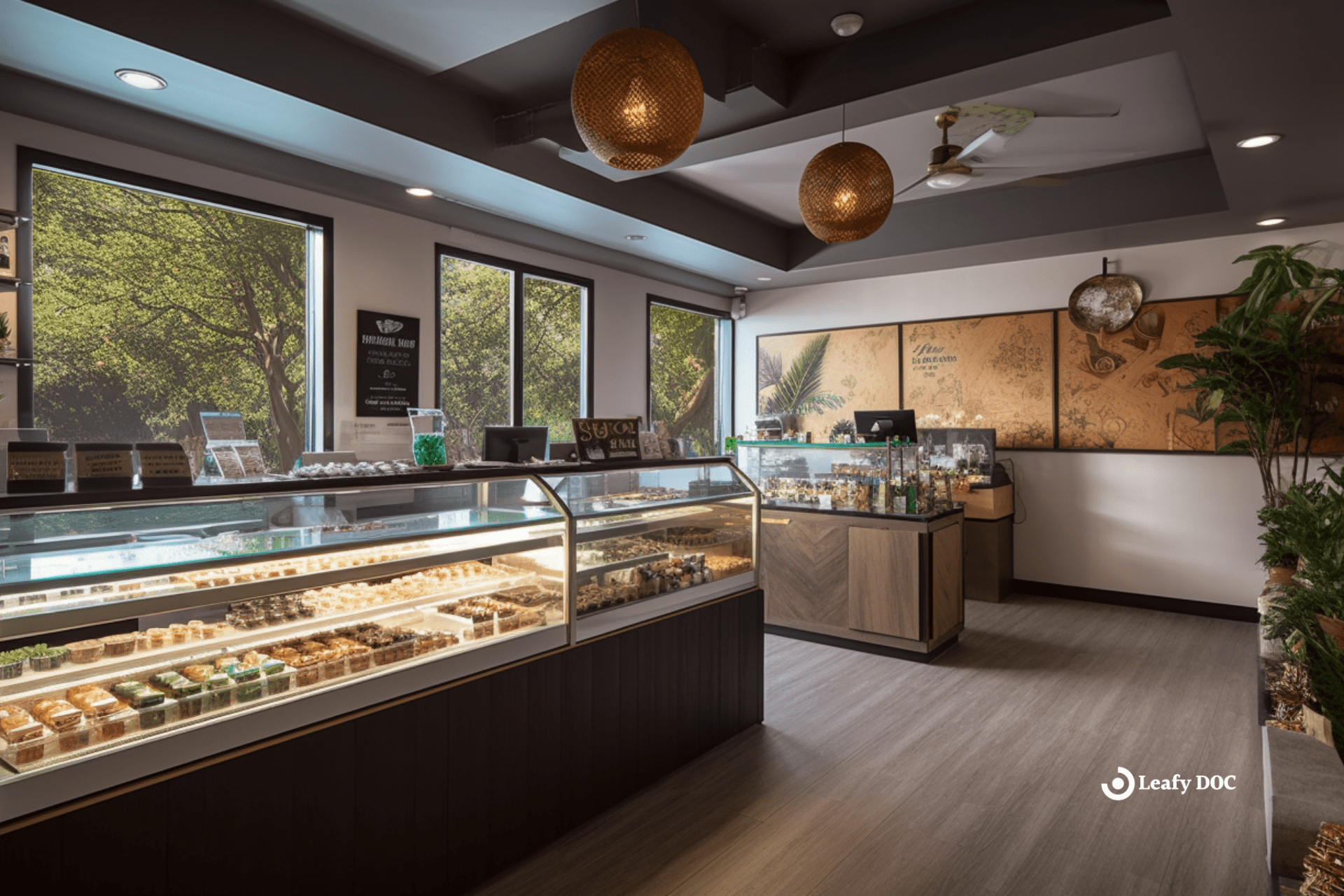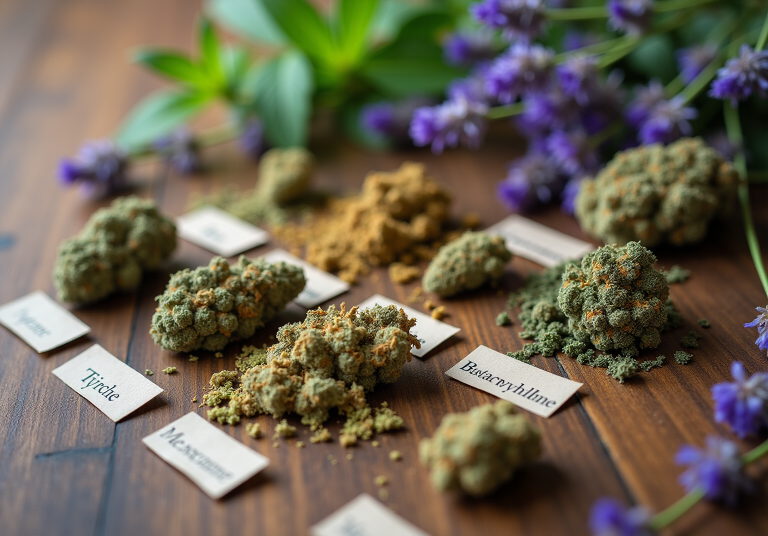What is a Budtender at a Dispensary?
by Haley Mills · November 10, 2023
Uncover the secrets of a budtender at a dispensary – from strain knowledge to customer service skills. Find out what it takes to be a cannabis connoisseur and enhance your dispensary experience. Click here to learn more about what a budtender does!

A budtender plays a crucial role in the operation of a dispensary, serving as the face of the establishment and providing customers with valuable guidance and assistance. They are knowledgeable professionals who possess a deep understanding of cannabis products and their effects.
In this article, we will explore the roles and responsibilities of a budtender, the knowledge and expertise required for the job, as well as the importance of customer service skills and compliance with legal requirements.
Key Takeaways
- Budtenders at dispensaries are responsible for ensuring that product labels and packaging comply with state regulations.
- Compliance and legal requirements are crucial for budtenders to ensure a safe and legal experience for customers.
- Budtenders must complete compliance training and stay updated with regulations to protect the dispensary’s reputation.
- State regulations dictate specific information that must be included on product labels, and budtenders must adhere to these guidelines.
Roles and Responsibilities of a Budtender
A budtender at a dispensary is responsible for assisting customers in selecting and purchasing cannabis products. They play a crucial role in educating customers about the various strains, products, and consumption methods available. Budtenders are knowledgeable about the effects and benefits of different cannabis products, and they can provide recommendations based on the customer’s preferences and needs.
They are also responsible for ensuring that customers are aware of the laws and regulations surrounding the purchase and use of cannabis. In order to become a budtender, training and certification are often required. Many states have specific requirements for budtenders, such as completing a certain number of hours of training or obtaining a cannabis-specific certification. This training ensures that budtenders have a solid understanding of the different cannabis products and their effects, as well as the regulations that govern their sale.
In addition to assisting customers, budtenders also play a role in sales and inventory management. They are responsible for maintaining accurate records of sales and inventory, ensuring that products are properly labeled and stored, and restocking shelves as needed. They may also be involved in ordering new products and managing vendor relationships. Budtenders need to have strong organizational skills and attention to detail to effectively manage the inventory and sales processes.
How to Become a Budtender
If you’re interested in starting a career as a budtender, the process is similar to other customer-facing roles—search for dispensary openings, send in your resume, and prepare for an interview. However, there are a few cannabis-specific steps you’ll want to know about in advance.
Meet state requirements
In many states where cannabis is legal, you may need to obtain specific credentials before you can work in a dispensary. This could include a cannabis worker permit, badge, or state-issued certification. The process varies by location—some states require background checks or even exams to get certified.
Review job postings closely
When browsing budtender job listings, pay close attention to what each dispensary expects. Some may help new employees complete certification requirements after hiring, while others will only consider candidates who already meet their state’s legal criteria.
Be ready to show your commitment
Having your certifications in place before applying not only makes you a more attractive candidate but also shows you’re serious about joining the cannabis industry. Once you’re hired, most dispensaries will provide on-the-job training to help you build your product knowledge and stay compliant with local regulations.
Common Misconceptions About Becoming a Budtender
One of the most common misconceptions about becoming a budtender is that you need to be a cannabis expert from day one. While a genuine interest in cannabis helps, most dispensaries provide thorough on-the-job training. New hires often start with basic responsibilities like tidying up or managing inventory systems before moving into product guidance and customer education.
This early phase is a great opportunity to shadow experienced team members, learn the ropes, and build your knowledge gradually. Dispensaries value curiosity and collaboration, so asking questions and seeking support from senior staff is encouraged. It not only helps you grow into the role but also ensures that customers receive accurate, helpful information from the start.
Applying for a Budtender Position
Getting hired as a budtender is similar to applying for other customer service roles, but with a few cannabis-specific requirements depending on your state.
Start by researching dispensaries in your area and checking job boards for current openings. Many dispensaries list whether they provide training or require you to already have cannabis-specific credentials.
In some states, you’ll need to obtain a badge, permit, or cannabis worker certification before applying. This process can include:
- Submitting an application to your state regulatory body
- Completing a background check or fingerprinting
- Passing a short exam (in some jurisdictions)
Before you apply:
- Confirm what credentials are required in your state or city
- Prepare your resume and any necessary documentation
- Brush up on cannabis product knowledge and basic compliance laws
Some dispensaries will assist new hires through the credentialing process, but many expect you to be certified in advance. Understanding your state’s regulations ensures you’re prepared and improves your chances of landing the role.
Medical vs. Recreational Budtender Roles
While the general responsibilities of a budtender stay consistent, like customer support, product education, and compliance, there are key differences between working at a medical versus a recreational dispensary.
Medical Budtender Responsibilities
Budtenders in medical cannabis dispensaries typically work with patients who use cannabis to manage specific health conditions. Their role may involve:
- Understanding medical cannabis laws and qualifying conditions in their state
- Reviewing and verifying medical marijuana cards or physician recommendations
- Recommending products based on patient symptoms or medical needs
- Tracking patient-specific purchase limits and maintaining confidentiality
- Offering detailed insight into cannabinoid profiles, therapeutic effects, and product types like tinctures, capsules, or topicals
Recreational Budtender Responsibilities
Budtenders in adult-use dispensaries serve customers 21+ who are purchasing for personal or social use. Their responsibilities often include:
- Verifying age and valid identification
- Recommending products based on desired effects, experience level, or consumption preferences
- Educating new users on dosage and safe consumption
- Staying current on local regulations and promoting responsible use
Each dispensary may have its own expectations, but understanding the environment, whether medical or recreational, can help you choose the right fit based on your interests, knowledge, and customer service approach.
Knowledge and Expertise Required
With extensive knowledge and expertise, budtenders curate the perfect cannabis experience for customers walking into a dispensary. These professionals are well-versed in the various strains, products, and consumption methods available in the cannabis industry. They undergo training programs to ensure they have a thorough understanding of the different cannabinoids, terpenes, and their effects on the body.
Budtenders are also knowledgeable about dosages and can guide customers on the appropriate amount of cannabis to consume based on their tolerance and desired effects. In addition to their product knowledge, budtenders stay up to date with the latest cannabis industry trends. They are aware of new strains and products entering the market, as well as any changes in regulations or laws that may affect the sale or consumption of cannabis.
This allows them to provide accurate and relevant information to customers, ensuring they make informed decisions about their cannabis purchases. Budtenders may also be knowledgeable about alternative cannabis products, such as edibles, tinctures, and topicals, and can guide their usage and effects.
Customer Service Skills
Effective communication is a crucial aspect of being a budtender. These professionals must be able to listen actively to customers’ needs and preferences, as well as provide clear and concise information about various cannabis products.
They should be able to ask probing questions to understand the customer’s specific requirements and offer appropriate recommendations based on their knowledge and expertise.
In addition to effective communication, budtenders should also possess strong problem-solving skills. They need to be able to assess the customer’s needs and find the best solutions to meet those needs. This may involve recommending specific strains or products that can address the customer’s desired effects or alleviate specific symptoms.
Budtenders should also be able to address any concerns or issues that may arise during the purchasing process. Whether it’s helping a customer find an alternative product if their preferred one is out of stock or resolving any conflicts that may arise, problem-solving skills are essential for providing exceptional customer service.
Budtenders serve as approachable cannabis experts for everyone who walks through the dispensary door—whether it’s someone exploring cannabis for the first time or a seasoned consumer looking for something new. They should be comfortable answering questions, asking thoughtful follow-ups, and making recommendations tailored to each customer’s desired effects or experience level.
By combining active listening with product knowledge and a friendly demeanor, budtenders help every customer feel confident, informed, and supported during their visit.
Product Recommendations and Education
When choosing the right product, a budtender at a dispensary can provide valuable recommendations and education. Budtenders are knowledgeable about the industry trends and stay up-to-date with the latest products and strains available in the market. They have a deep understanding of the different cannabis consumption methods and can guide customers based on their preferences and needs.
A budtender’s role is not just limited to selling products, but also to educate customers about the various options available to them. They can explain the differences between different strains and their effects, as well as suggest suitable products based on the customer’s desired experience. Whether it’s recommending a specific strain for relaxation or a particular product for pain relief, a budtender can offer personalized advice to enhance the customer’s cannabis experience.
In addition to their extensive product knowledge, budtenders also stay informed about industry trends. They are aware of new products, brands, and innovations in the cannabis market. This allows them to provide customers with the most up-to-date information and recommendations. By staying educated on industry trends, budtenders can help customers make informed decisions and explore new products that align with their preferences.
Can Budtenders Give Medical Advice?
Budtenders are trained to educate customers about cannabis strains, products, and consumption methods, but they are not licensed to provide medical advice. Even in medical dispensaries, their role is supportive and informational, not clinical.
While they may offer guidance on what products might suit general preferences or common wellness goals, any questions related to specific health conditions, medication interactions, or treatment plans should always be directed to a qualified healthcare provider. This ensures that patients receive safe, personalized care and that dispensaries remain compliant with medical regulations.
Health and Safety Considerations for Cannabis Use
When using cannabis, it’s important to understand some of the potential health risks and how different products can affect you. For example, edibles and infused products often take much longer to kick in—sometimes up to two hours. This delayed onset can lead to accidental overconsumption, resulting in unpleasant effects like dizziness, anxiety, or paranoia.
Cannabis can also impair coordination and reaction time, making it unsafe to drive or operate heavy machinery while under the influence. If you’re pregnant or breastfeeding, it’s best to avoid cannabis, as its compounds may pose risks during these stages.
Always store cannabis products safely out of reach of children and pets. Accidental ingestion can be harmful, and proper storage is part of responsible use. By staying mindful of these safety tips, customers can enjoy cannabis more confidently and responsibly.
Compliance and Legal Requirements
Compliance and legal requirements play a crucial role in the responsibilities of a budtender at a dispensary. As the frontline employees interacting with customers, budtenders must adhere to strict guidelines set forth by state regulations. This includes completing compliance training to ensure they’re knowledgeable about the laws and regulations surrounding the sale of cannabis products.
One of the key aspects of compliance training for budtenders is understanding the state regulations regarding age restrictions and identification requirements. They must verify the age and identity of customers before selling any cannabis products, as it’s illegal to sell to minors.
Additionally, budtenders must also be aware of any restrictions on the quantity of products that can be sold to a single customer, as well as any limitations on the types of products that can be sold.
In addition to age restrictions and identification requirements, budtenders must also be knowledgeable about the proper labeling and packaging of cannabis products. State regulations often dictate specific information that must be included on product labels, such as THC and CBD content, serving sizes, and warning labels.
Budtenders must ensure that all products on the dispensary shelves are properly labeled and packaged according to these regulations.
Certification, Permits, and Local Compliance
In many states where cannabis is legal, budtenders must obtain a state-issued badge, certification, or work permit before joining a dispensary. This process varies by location. In some cases, it’s a simple registration; in others, it may involve fingerprinting, background checks, or passing a cannabis compliance exam.
Job listings typically outline the required credentials, so it’s important to check both your local laws and the dispensary’s expectations before applying. Some employers offer guidance through the certification process, but others require you to be fully credentialed ahead of time.
Staying Compliant in a Changing Industry
Cannabis regulations can change rapidly at the state or municipal level. Budtenders must stay informed through ongoing compliance training and regular updates from their employer. This not only protects the dispensary from legal penalties but ensures a safe and responsible customer experience.
By understanding local laws, following proper procedures, and keeping certifications current, budtenders play a key role in maintaining the legal integrity of the dispensary environment.
Frequently Asked Questions
What is the average salary range for a budtender at a dispensary?
The average salary range for a budtender at a dispensary can vary depending on location, experience, and job responsibilities. However, job satisfaction for budtenders is generally high due to the unique nature of the industry.
Can budtenders legally consume cannabis while on the job?
No, budtenders cannot legally consume cannabis while on the job due to workplace regulations. Allowing employees to consume cannabis could potentially impair their productivity and create a liability for the dispensary.
Are there any age restrictions for becoming a budtender at a dispensary?
There are typically no age restrictions for becoming a budtender at a dispensary, as long as the individual meets the education requirements and possesses the necessary skills and qualities to excel in the role.
How long does it typically take to become a certified budtender?
The length of time it takes to become a certified budtender can vary depending on the training program and individual progress. Training requirements often include learning about cannabis products, customer service skills, and state regulations. Budtenders are responsible for assisting customers, providing product recommendations, and ensuring compliance with legal requirements.
What are the potential career advancement opportunities for a budtender at a dispensary?
Career growth and advancement opportunities for a budtender at a dispensary can include becoming a lead budtender, a dispensary manager, or even opening their own dispensary. With experience and additional training, the possibilities are vast.
Is previous cannabis experience required to become a budtender?
Not necessarily. While having basic cannabis knowledge can help during interviews, many dispensaries provide on-the-job training. What matters more is your enthusiasm, communication skills, and willingness to learn the ropes, including product details, laws, and customer service techniques.
Where does the term “budtender” come from?
The word “budtender” is inspired by “bartender,” replacing “bar” with “bud” to reflect the cannabis industry. Originally slang, it was officially added to the Merriam-Webster Dictionary in 2018 as the role became more recognized.
Last Updated: July 11, 2025
Get Approved for Your Medical Marijuana Card in Minutes!

Get Your Medical Card
Connect with a licensed physician online in minutes

Like This Article?
Share with your friends
Table of Contents
Keep Reading
-
4 Steps for Medical Marijuana Renewal PA Made Easy
Simplify your medical marijuana renewal in PA with essential steps and guidelines.
-
Top 5 Ways to Consume Cannabis Without Smoking It
Discover the top 5 ways to consume cannabis without smoking it. Learn about alternative consumption methods for medical marijuana and how they can benefit your health.
-
4 Steps to Use a Terpenes Profile Chart for Pain Relief
Discover how to use a terpenes profile chart for effective pain relief solutions.



